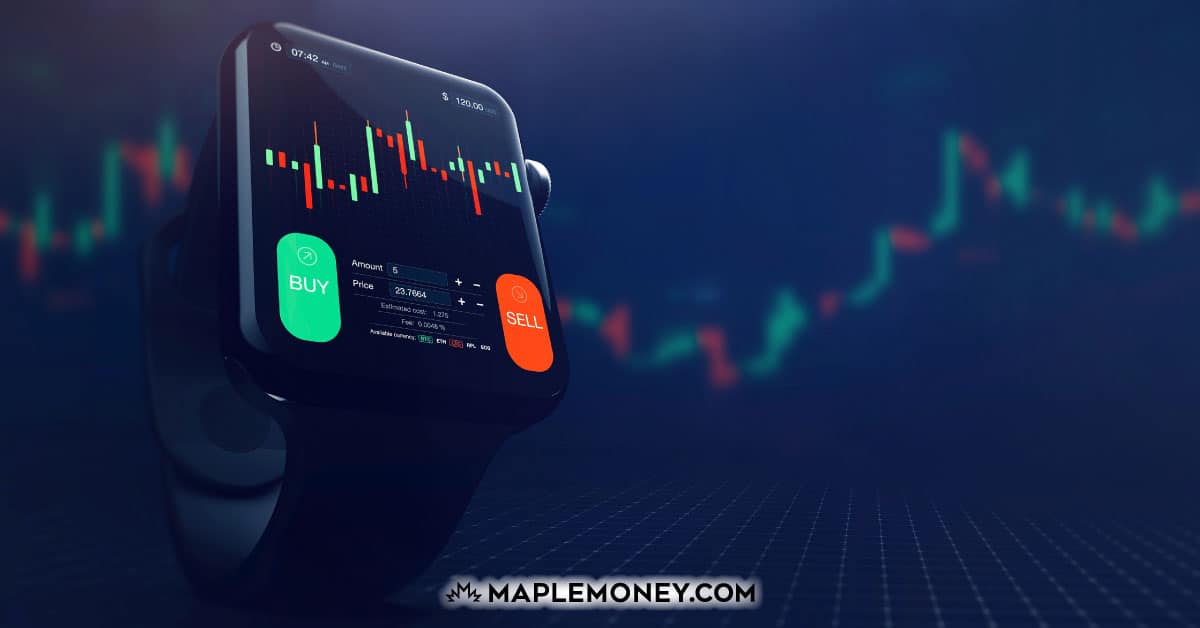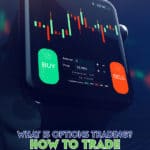What Is Options Trading? How to Trade Options In Canada

Many experienced investors look to options trading in order to increase their potential profits. Although options are traded like stocks and mutual funds, they are not actual securities. Instead, they are considered derivatives, because their value is dependent on the price of another asset. In other words, options have no value without underlying security.
In this introduction to options trading, I’ll explain how options work and explore the key terminology, including a few of the strategies employed by options traders. I’ll also show you where to go to start trading options. Ready? Let’s dive in!
What Are Options?
Options are contracts that permit an investor to buy or sell a stock at a predetermined price. The contract covers a specific period of time. ETFs can also be included in an options contract. When you purchase an options contract, you are not buying a stock. You are buying the right to exercise the option up to the expiration date. Most options contracts are bought and sold in blocks of 100 shares. Investors are not obligated to exercise an options contract – they can back out at any time.
Call Options
An option contract to buy a stock at a specific price, called the strike price, in the future is referred to as a call option. When you purchase a call option, you are hoping that the stock or ETF will rise in value so you can exercise the option to sell the stock at a profit. If the stock price rises beyond the strike price before the expiry date, you can exercise the call option for a profit.
If the stock price never exceeds the strike price, the option is considered to be “out-of-the-money” and you are in a position to take a loss on the call option. With a call option, the lower the strike price, the higher the value.
Put Options
A put option is a contract that allows the investor to sell a specific number of shares at a predetermined price by the expiration date. An investor who purchases a put option is expecting the underlying stock’s market price to fall so they can realize a profit. To profit from a put option, the strike price must be below the stock price. With a put option, the higher the strike price, the higher the intrinsic value.
What Is the Option Premium?
An option premium is the total price to buy the option. It’s usually expressed on a per-share basis, and each contract includes 100 shares. The premium is based on intrinsic value and its time value, which is referred to as extrinsic value. The higher the intrinsic or extrinsic value, the higher the premium.
Long-Term and Short-Term Options
Options can be identified by their duration. Long-term options have expiration dates over 1-year, while short-term options expire in under a year. Generally speaking, short-term options are cheaper to buy than long-term. They are often used to take advantage of a significant event involving the underlying asset.
Long-term options are more expensive due to an increased time value. In other words, there is more time for the stock price to rise. Investors often use long-term options as leverage to anticipate the long-term appreciation of a stock’s price.
In-the-Money vs. Out-of-the-Money
When an options contract is “in-the-money,” it means that you can sell it for a profit. Conversely, you cannot immediately sell out-of-the-money option contracts for a profit. Using call and put options as an example, the strike price of an in-the-money contract on a call option will be lower than the underlying stock price. On a put option, the strike price will be lower than that of the underlying stock.
What Is the Strike Price?
The strike price is a critical component of options trading. It’s the price at which the underlying security in an options contract can be bought or sold. For call options, the strike price is the price at which you can buy the stock. For put options, it’s the price at which you can sell the security. The strike price is what determines the value of an options contract.
What Is An Options Market?
An options market is where you buy and sell options contracts. Because an option is not an actual security, the stock exchange doesn’t list it like stock or an ETF. You can, however, trade options inside an online brokerage account, the same place you buy and sell stock.
Where Can I Trade Options In Canada?
If you’re interested in trading options, you’ll want to open an online brokerage account. If you already have an account, make sure that it allows you to buy and sell options. There’s no shortage of Canadian online brokers from which to choose. All of the big banks have their own, and there are several independent brokers. Here at MapleMoney, our top overall online broker is Questrade, but when it comes to trading options, we recommend Interactive Brokers.
Options Trading with Interactive Brokers
Interactive Brokers, or IBKR, is a large US-based online discount brokerage with operations in Canada. In the US, Interactive Brokers is popular with active traders because of their low fees. The service offering isn’t quite as attractive in Canada, but IBKR still compares favourably to other Canadian brokers for options trading and other tools for active traders.
Key Features
- Lowest overall option trading rates in Canada
- Ability to trade options in markets outside North America
- The flexibility of tiered or fixed pricing
- Min. 2 years trading experience requirement for options
- Margin requirement ranges between 0% – 30%
Because Interactive Brokers offers investors access to over 130 markets in 33 countries, their option pricing structure varies depending on where you are located. For the Canadian market, IBKR uses a tired commission pricing. So, the more options contracts you trade, the lower the price. For example, if your trading volume is under 10,000/month, the price is 1.25 CAD per contract. If the volume is over 100,000/month, the fee is as low as 1.00 CAD per contract.
If you’re looking for the lowest prices and access to global markets for options trading, IBKR is the way to go. For more information, check out our full review of Interactive Brokers Canada.
Benefits of Option Trading
When you trade options, you are using leverage to increase the potential profit on an underlying security. At the same time, you are limiting your downside to the premium paid.
For example, let’s say you have a budget of $10,000 to invest. You can afford to purchase 100 shares of a stock valued at $100 each.
However, if the call option for a single share of the same stock is $5.00, and the contract includes 100 shares ($500 per contract), you can buy 20 contracts at $500 each with your $10,000. Your call options represent 2000 shares.
Option Trading Drawbacks
In addition to the benefits, options traders should always be aware of the drawbacks of options trading. For starters, most options contracts are focused on the short-term fluctuations of the underlying security, which can be very difficult to predict. It’s no secret that stocks should be considered long-term investments.
Also, there are additional costs to trading options contracts, in the form of fees, which can impact profits. You should always consider this when measuring the value of options trading. Lastly, depending on the strategy you employ, losses may be magnified due to the leveraged nature of options trading.
What Is a Covered Call?
A covered call occurs when an investor sells call options on the security they already hold in a long position. It limits potential gains and losses because the trader has already purchased the underlying security. For example, the maximum profit is limited to the premium or the price of the options contract.
With a covered call, the goal is usually to make a modest profit on the option premiums when the investor doesn’t expect a steep short-term increase in the underlying security. I’ve included a brief description of standard options strategies is included in the glossary below.
Options Trading Glossary
For beginners, options trading can seem very complicated, and the terminology foreign. To help, here is a list of some common options trading terms that we’ve used in the article.
Option Contract – A contract that allows an investor to buy or sell stock at a predetermined price for a specific period. The owner of an options contract does not own the underlying stock.
Option Premium – The total cost incurred to buy an option.
Call Option – A contract that gives an investor the right to purchase shares of stock in the future at a predetermined price.
Put Option – A contract that gives an investor the right to sell shares of a stock in the future at a predetermined price.
Strike Price – The price you agree to buy or sell the underlying stock in an options contract.
Expiration Date – The date at which an options contract expires.
Covered Call – An options strategy that acts as a hedge against losses at the expense of some upside potential.
Intrinsic Value – Intrinsic value represents the difference between the strike price and the underlying asset price.
Extrinsic value – The time value of an option contract.
Iron Condors – An option strategy that allows the investor to profit when the underlying security price goes up or down.
Married Put – An option strategy involving the purchase of a put option (at-the-money) while holding a long position of the underlying stock. The purpose of this strategy is to protect against price depreciation.
Straddle – An option strategy where both put and call options are purchased with the same strike price and expiration date. Traders employ a straddle when they expect a stock’s price to either rise or fall sharply.
Strangle – An option strategy involving different strike prices on a call and a put option. The underlying asset and the expiration date are identical.
Protective Collar – An options strategy that uses a protective put and a covered call to protect against large losses.
Final Thoughts On Options Trading
If you’re interested in trading options, I highly recommend gaining experience with trading stocks and ETFs first. Options are complex and can be very risky if you don’t have at least a working knowledge. Most online brokers screen potential options investors, but that’s no guarantee that you’re fully prepared to begin buying and selling puts and calls. If you are ready, options trading offers the potential to enhance returns and boost profits.

